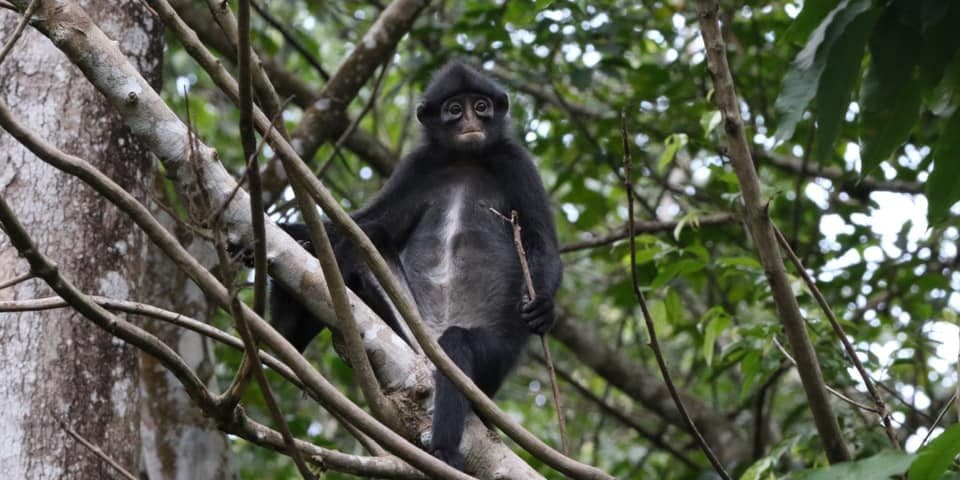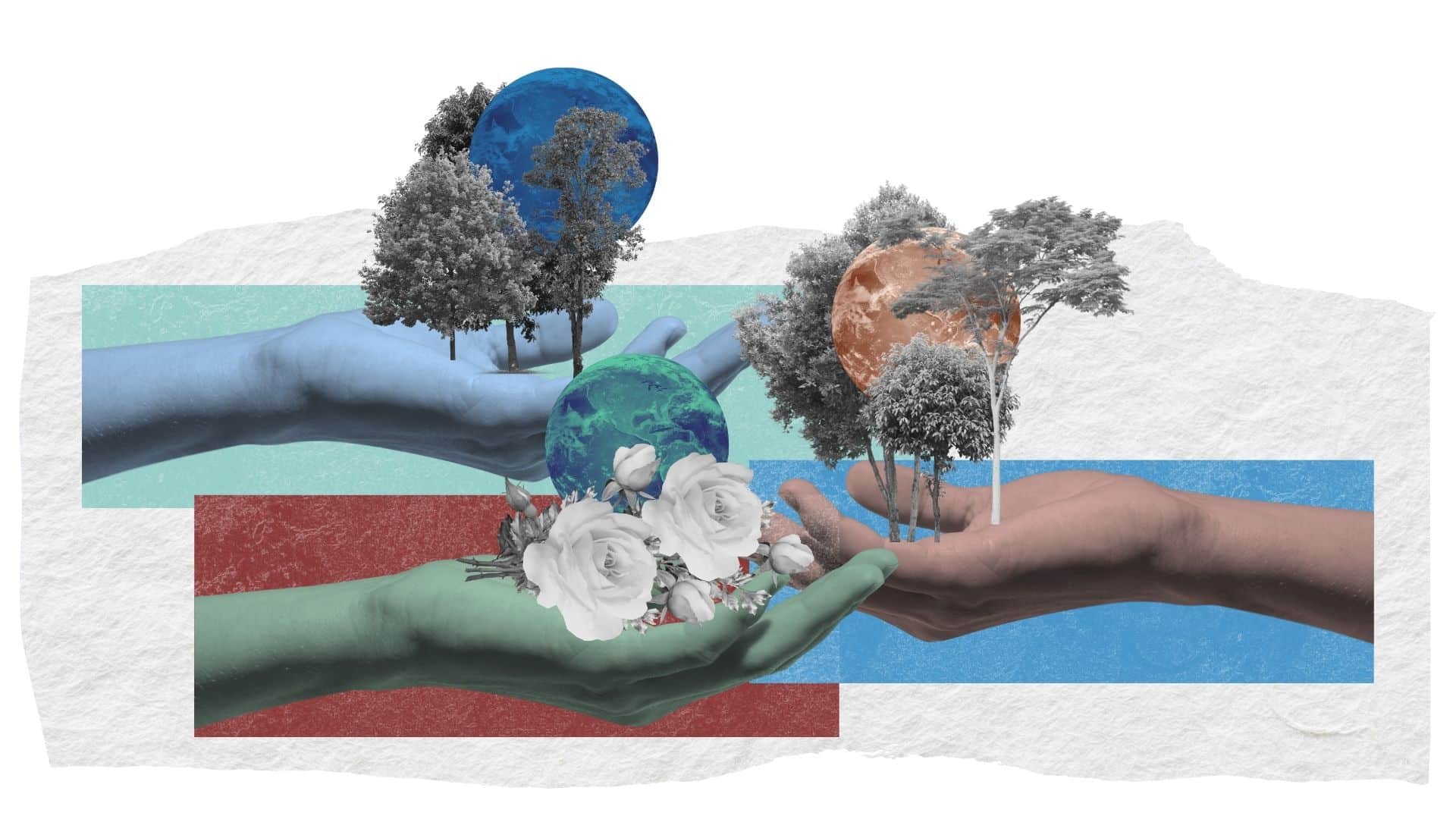God calls them “good”: Caring for wildlife in our midst
Salt&Light celebrates God's creatures big and small on World Wildlife Day today.
Nicholas Chuan // March 3, 2022, 4:41 pm

Photo from Raffles Banded Langurs Working Group (@RBLWG) Facebook.
A songbird poached to the edge of extinction is thriving in Singapore.
In December, a rare vulture was spotted on our island for the first time.
Unbeknown to most, our island is home to some 40 to 60 Raffles banded langurs first discovered by Sir Stamford Raffles 200 years ago.
Even our otter population, thought to be extinct from the 1960s, has made a comeback and splashed into international news (read more here and here).
The Bible reveals to us a theocentric view of creation, where wildlife is valuable because it brings glory to God.
Just last Friday (February 25), a new rehabilitation centre to provide veterinary care for wild animals rescued by the National Parks Board was opened. It was set up to receive abandoned or rescued wildlife such as mammals, reptiles and birds that may be injured or in distress.
Then again, you may have read in the news or encountered wild boars eating trash at void decks or macaques stealing students’ homework.
Singapore, our highly-urbanised, land-scarce city-state, is teeming with wildlife.
Wildlife is fun to observe. But should we care about how our activities affect them and their habitats?
Some may even ask: Why not feed those cute little monkeys? (Even if they lose their foraging ability, become aggressive towards us, or fall ill from eating processed food?)
Nicholas Chuan, whose field of work involves educating the public on positive human-wildlife interactions, shares his reflections on caring for the wildlife within our midst through a theological lens.
Why a theological survey of wildlife?
As Christians, how should we interact with and care for wildlife? And what does the Bible say about this subject — if at all?
Creation — wildlife included — is a key actor throughout the biblical narrative.
The Bible does have much to say about wildlife, even if we don’t hear much about it from pulpits.
Creation — wildlife included — is not simply the backdrop of a grand opening scene in Genesis; it is a key actor throughout the biblical narrative.
The Bible reveals to us a theocentric view of creation, where wildlife is valuable because it brings glory to God. So we praise our Creator alongside our fellow creatures. And we ought to care for wildlife, because God calls them good.
“It was good”
On the fifth day of the creation story, God created the sea creatures and birds; and on the sixth, land creatures. And He “saw that it was good” (Genesis 1:21, 25). God Himself declares that wildlife is good – and that’s before humans even came into the picture!
And why is wildlife any “good”, we may ask.
In Psalm 104, sandwiched between the opening and closing exaltations of God is an extended description of the beauty and diversity of God’s creation, including — don’t miss it — wildlife!
Donkeys, birds, storks, goats, badgers, beasts, and lions (Psalm 104:11-12, 17-18, 20-22).
To conserve habitats and food sources for wildlife is to exercise our God-given dominion over creation … to obey God.
All these, the psalmist marvels at, and he praises God.
He cries out, “O Lord, how manifold are Your works! In wisdom have you made them all; the earth is full of your creatures.” (Psalm 104:24)
Alongside the rest of creation, wildlife glorifies the Creator — and so it is good.
How, then, are we supposed to treat these manifold works of God — the wildlife we share this earth with?
Look back at Genesis 1: Then God said, “Let us make man in our image, after our likeness. And let them have dominion over the fish of the sea and over the birds of the heavens and over the livestock and over all the earth and over every creeping thing that creeps on the earth.” (Genesis 1:26)
To be clear, humanity is set apart to occupy a special place in creation (Psalm 8:4-8). We bear God’s image; wildlife doesn’t.
What God entrusts us to do is to have dominion over wildlife – to “rule” (NIV) or “reign” (NLT).
I believe God was impressing upon Adam and Eve that the earth was not theirs alone; we are to share the natural resources with wildlife whom we live amongst.
To conserve habitats and food sources for wildlife is to exercise our God-given dominion over creation; it is to obey God.
An act of de-creation
But the idyllic picture was not to last. Adam and Eve disobeyed God; sin entered creation. The “thorns and thistles” in God’s curse reveals the effect sin had on humanity’s relationship with agriculture (Genesis 3:17-18), but the later biblical narrative reveals, too, the effects on wildlife.
In Jeremiah, the prophet describes a sin-filled earth as being “without form and void” (Jeremiah 4:23) — the very term describing the pre-Creation state (see Genesis 1:2).
In Jeremiah’s eyes, sin is an act of de-creation: the mountains quaked, the land became deserted, and birds fled (Jeremiah 4:25, 9:12-14; 12:4, 10-11). Because of sin, wildlife languishes; God’s creation is undone.
Redemption of creation
Praise be to God, for He did not leave creation in the lurch. God Himself came into His broken and desolate creation to redeem it from the curse of sin and death.
Jesus died to achieve redemption for our sins and redemption of creation. Through Jesus’ death, God “was pleased to … reconcile to Himself all things” (Colossians 1:20), and so order aright humanity’s distorted relationship with creation.
When Jesus was in the wilderness after resisting the devil’s temptations, He was “with the wild animals” (Mark 1:12-13). A fully human being sat amidst wildlife – peacefully, gently, idyllically – a harkening back to Eden.
Now seated at the right hand of the Father, Jesus reigns as King, to the praise of “every creature in heaven and on earth and under the earth and in the sea, and all that is in them” (Revelation 5:13).
As God’s redeemed people, we are called to join in the chorus of all creation to sing to the glory of our Saviour King.
Godly dominion
Yet, until that final day, we continue to struggle with our sinful nature and yearn for freedom from sin. Creation, too, is “groaning” for that day (Romans 8:19-22).
And how breathtakingly beautiful that final day will be. Just like Jesus did with wildlife, little children would dwell in peace with wolves, lambs, leopards, goats, calves, lions, and cobras: “They shall not hurt or destroy”! (Isaiah 11:6-9, 65:25).
What this implies about predatorial diets remains a mystery, but we know that we will, like Jesus, be with wildlife — as we were created to be.
Godly dominion means we commit to caring for the animals we have adopted as pets.
Still, before that day comes, I make two appeals:
First, stay on designated trails in our parks. Straying from designated paths unduly damages wildlife habitats.
Two, do not release animals that have been kept in captivity into the wild, whether they are pets that have outgrown their cuteness or mercy-released fish. It either kills them (for example, putting freshwater fish into saltwater) or upsets the balance of the ecosystem.
Godly dominion means we commit to caring for the animals we have adopted as pets.
You could make a positive impact by donating to causes championing animals, wildlife or our environment. Or volunteer with groups like Creation Care SG. Be conscious of your consumption habits.
So let us await this new Creation where we will truly co-exist with wildlife, in a city in nature far more glorious. (Revelation 21)
Nevertheless, as individual Christians, let us respect the value God has bestowed upon wildlife, steward our common resources responsibly, and await the day when we stand alongside all wildlife, to worship the Lion of Judah, the Lamb who was slain.
RELATED STORIES:
We are an independent, non-profit organisation that relies on the generosity of our readers, such as yourself, to continue serving the kingdom. Every dollar donated goes directly back into our editorial coverage.
Would you consider partnering with us in our kingdom work by supporting us financially, either as a one-off donation, or a recurring pledge?
Support Salt&Light


